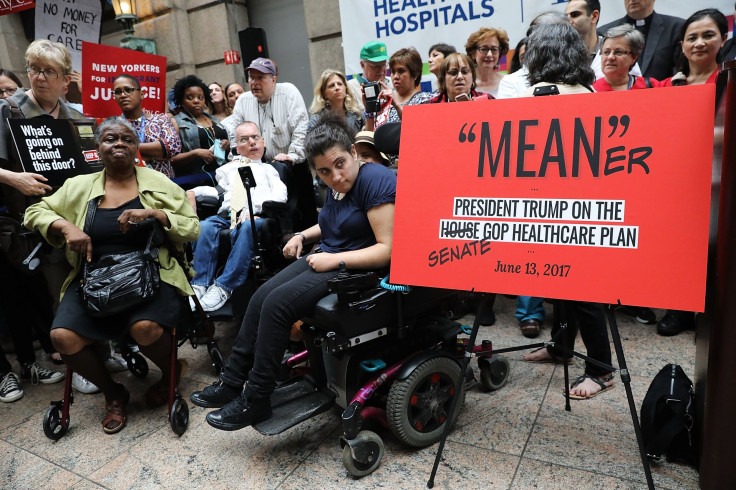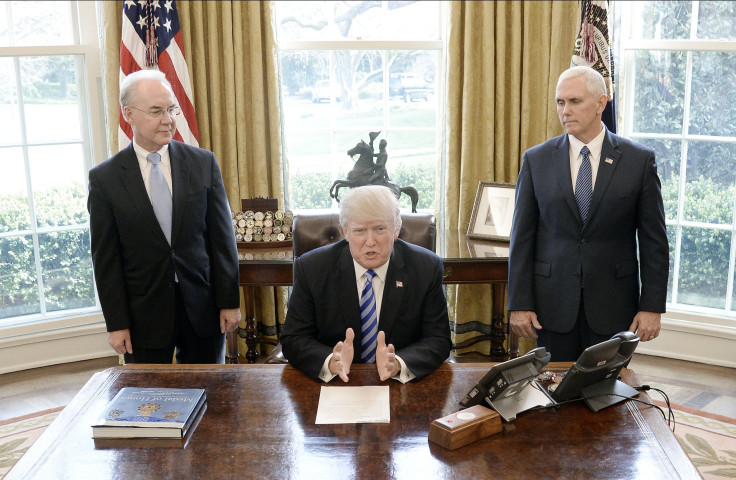Senate Healthcare Bill Could Increase Premature Deaths In US, Report Claims

Ever since President Donald Trump's administration introduced the Senate healthcare bill, there were rumors that an increased number of people stand a chance of losing their health coverage. However, the number of people who will be affected became clear once the nonpartisan Congressional Budget Office (CBO) released its detailed analysis of the bill Monday.
The Affordable Care Act, a health-care law, also knwn as Obamacare implemented by the administration of former President Barack Obama, before which up to 47 million were uninsured, has led to 28.4 million people being uninsured at present. And in case the Senate approves the healthcare bill, designed to repeal and replace Obamacare, an additional 22 million people will find themselves without health insurance in the next decade, stated CBO’s analysis.
According to a new report by Annals of Internal Medicine, published Monday, adults who have health insurance are 71-97 percent less likely to die a premature death than those who are without insurance.
“Thousands of people are already dying each year because the Affordable Care Act has left 28 million uninsured,” said Dr. Steffie Woolhandler, an internal medicine physician in the South Bronx area of New York and co-author of the report. “The Republican health reform bills would increase that death toll.”
Read: Trumpcare Update: Senate Democrats Protest Republican Healthcare Act For Being Written 'In Secret'
To Woolhandler, it is simple math. “Losing insurance is lethal and gaining insurance reduces the death rate,” she added. And to that end, she advised the “politicians in Washington” to “to deal with that as a fact and not pretend there's disagreement on this issue. There's no disagreement on this issue if you examine the science.”
Despite a number of studies being published on how healthcare impacts the lives of the masses, many Republicans still hold the view that healthcare policies do little to save people’s lives. "Nobody dies because they don't have access to health care,” said Idaho Rep. Raúl Labrador, a Republican, CBS News reported.
After facing outrage over his comment, Labrador tried to explain that his statement was taken out of context. "I was trying to explain that all hospitals are required by law to treat patients in need of emergency care regardless of their ability to pay and that the Republican plan does not change that," he stated in a Facebook post.
Read: How AI Technology Adoption In Healthcare Is Changing The Industry
Dr. David Himmelstein, who co-wrote the report with Woolhandler, disagreed with Labrador’s view of healthcare, stating that it is common sense that health coverage gives one the added advantage of visiting a doctor without hesitation when suffering from an illness.

“People get to see the doctor or nurse practitioner... and get their health problems taken care of. If you don't have health insurance you're unlikely to get treatment for your diabetes or your depression."
The report by Annals also references former Massachusetts Gov. Mitt Romney’s 2006 universal healthcare initiative in his state. Due to the expansion of insurance coverage, more adults were able to enjoy the health benefits provided under the revised policy. As a result, it was observed that for every 830 adults who gained health insurance, one premature death per year was averted. This also led to mortality rate decreasing by 2.9 percent in Massachusetts.
The report claims that apart from health benefits, insured individuals also stands to enjoy “improved self-rated health, financial protection, and reduced likelihood of depression,” under a healthcare plan that is designed under the sole objective of making as many people insured as possible.
© Copyright IBTimes 2024. All rights reserved.












